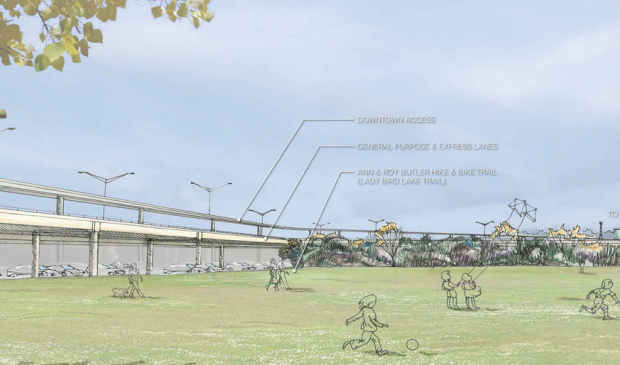Opposition to MoPac lanes grows stronger
Monday, May 4, 2015 by
Audrey McGlinchy, KUT Opposition to the 2040 Regional Transportation Plan is escalating as members of the Capital Area Metropolitan Planning Organization Transportation Policy Board prepare to take a final vote on the long-range plan next week.
City of Austin and Travis County officials held a rally Saturday urging the Central Texas Regional Mobility Authority to downsize the proposed four toll lanes on MoPac South and revert to the area’s 2035 plan, which calls for only two toll lanes — one in each direction.
“I’m not against additional lanes,” Travis County Commissioner Brigid Shea, whose office organized the rally, told the Austin Monitor. “I just want them to benefit the majority of drivers.”
The toll lanes, though free to buses and designated van shares, would use fare to manage car traffic: The price rises as more vehicles enter the lanes, theoretically deterring more drivers from taking the express roads and in turn helping maintain a travel speed of 50 mph. In a Land, Facilities and Programs Committee meeting last month, representatives from CTRMA said the price would not have a cap. In other city meetings, CTRMA representatives have said toll prices will be capped between $12 and $14.
“These are toll lanes for the 1 percent,” said Shea.
While more than 200 people showed up to Saturday’s rally, opposition to the 2040 plan has been mounting for months in city meetings and department offices.
At its meeting Tuesday, the Parks and Recreation Board voted 4-0 against recommending that Council approve the plan, with member Sarah Roth abstaining and members Hill Abell and Dale Glover absent. In their decision, board members cited the environmental impact these lanes might have on Zilker Park, including increased noise.
In response to community feedback, CTRMA staff has said it will reconsider these toll lanes — whether there need to be four, and if the lanes need to be elevated. “The elevated structure is not a done deal,” CTRMA Deputy Executive Director Mario Espinoza told Parks board members Tuesday. “We’re looking at other alternatives to maybe even avoid having to build that alternative structure.”
But this openness was not clear at last month’s meeting of the CAMPO Transportation Policy Board. CTRMA Executive Director Mike Heiligenstein told members that any toll lanes included in the MoPac South expansion plan would most likely have to be elevated.
Council members will consider the Parks board’s recommendation Thursday when they vote on whether to direct the city manager to look at alternatives to these proposed toll lanes. That resolution already says the City of Austin formally opposes four toll lanes being built as part of the plan for MoPac South.
Council members will also consider several objections to the 2040 plan made by the city’s Transportation Department. In a memo to Council and Mayor Steve Adler, the department wrote that while it generally supported the plan, staff was concerned about the effect four toll lanes would have on the environment and traffic patterns. The department said it could get behind two lanes, as already approved in the 2035 plan.
Although Shea said next week’s vote by CAMPO’s Transportation Policy Board is final, amendments are still possible — just harder to make. But the city and county have made clear what they want to happen, said Shea.
“It seems particularly offensive that (CTRMA is) so unwilling to scale this back as the city and county have been requesting,” she said.
On Saturday, Heiligenstein released a statement about the plan, and emphasized that the environmental study was still underway.
“We know building a project like this isn’t something you can rush into. That’s why we are in the midst of a detailed and thorough environmental study – it’s mandated by federal law. We started the study a couple of years ago, and we’re about a year away before it’s complete – so there is plenty of opportunity for citizens to get informed and stay involved. In fact, based on community concerns, we have extended the study period to allow for additional feedback,” wrote Heiligenstein. “Other ideas on how to get commuters in and out of downtown are being studied.”
Image courtesy of the Central Texas Regional Mobility Authority.
You're a community leader
And we’re honored you look to us for serious, in-depth news. You know a strong community needs local and dedicated watchdog reporting. We’re here for you and that won’t change. Now will you take the powerful next step and support our nonprofit news organization?









